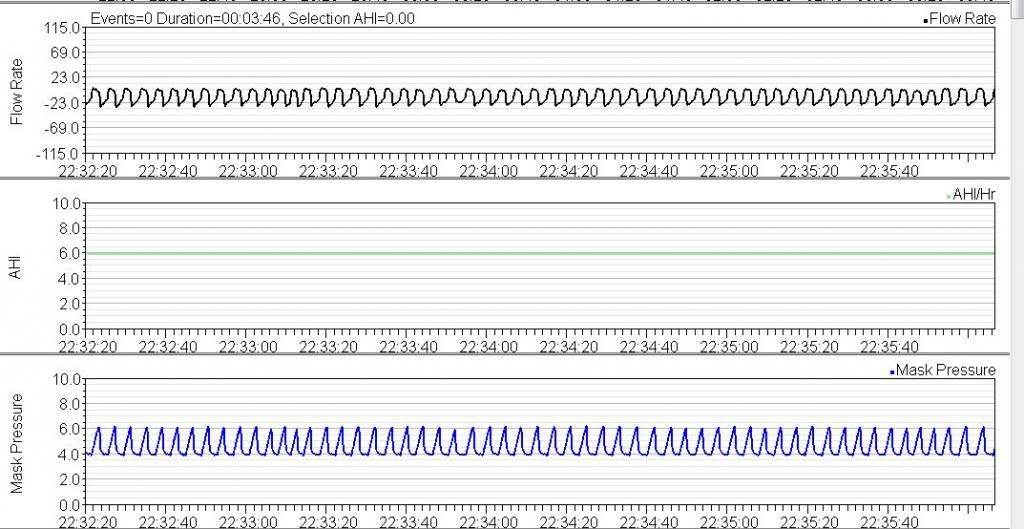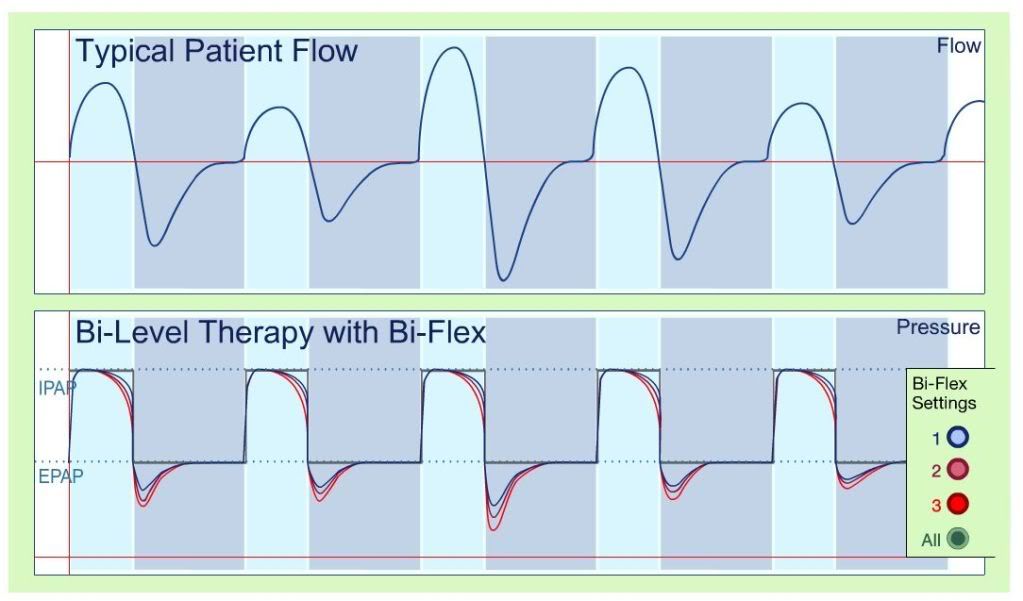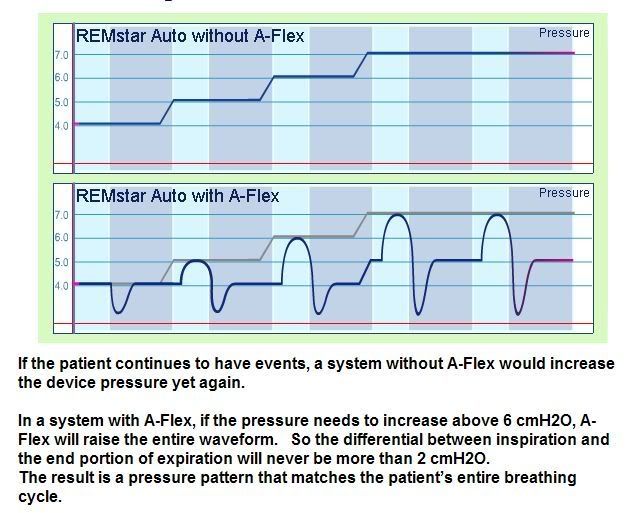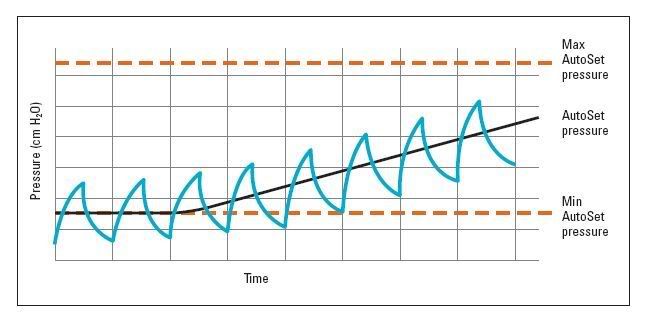CPAP Basics - 15 - Machine Expiratory Comfort Options
- Drowsy Dancer
- Posts: 1271
- Joined: Mon Feb 28, 2011 9:35 am
- Location: here
Re: CPAP Basics - 15 - Machine Expiratory Comfort Options
Does there exist anywhere a clear explanation of the actual differences:
(1) between C-Flex, C-Flex+ and A-Flex? (And why is there no A-Flex+? But I digress...)
(2) between the 1, 2, and 3 settings of the above? Is it just an arithmetic progression?
It may be that the answer to (1) is that the algorithms differ in ways too mysterious for a layperson to understand, but I'm assuming that it has something to do with the exact timing of the relief. I've never found the info from Respironics particularly clear.
(1) between C-Flex, C-Flex+ and A-Flex? (And why is there no A-Flex+? But I digress...)
(2) between the 1, 2, and 3 settings of the above? Is it just an arithmetic progression?
It may be that the answer to (1) is that the algorithms differ in ways too mysterious for a layperson to understand, but I'm assuming that it has something to do with the exact timing of the relief. I've never found the info from Respironics particularly clear.
_________________
| Machine: PR System One REMStar 60 Series Auto CPAP Machine |
| Mask: Swift™ FX Bella Nasal Pillow CPAP Mask with Headgears |
| Additional Comments: Software: SleepyHead. Pressure: APAP 9.5 min/11 max, A-Flex x2 |
How we squander our hours of pain. -- Rilke
Re: CPAP Basics - 15 - Machine Expiratory Comfort Options
In reworking the Respironics definitions:
C-Flex reduces pressure at the beginning of exhalation and returns to therapeutic pressure just before inhalation. The level of pressure relief varies based on the patient’s expiratory flow and which of the three C-Flex settings has been selected.
C-Flex+ operates in fixed CPAP mode, providing flow-based pressure relief at the beginning of exhalation a la C-Flex, and softens the pressure transition from inhalation to exhalation a la A-Flex.
A-Flex works in the auto-CPAP mode, providing flow-based pressure relief at the beginning of exhalation a la C-Flex, and softens the pressure transition from inhalation to exhalation.
Take a deep breath and hold it. Exhale. Take a deep breath but move smoothly into exhalation. That's A-Flex.
Take a deep breath, then exhale half. Inhale again and exhale halfway. Inhale again and exhale completely. That's C-Flex.
The numbers of x-Flex are just reference numbers, and C-Flex effect will also increase the harder one exhales.
"+" is the I/E transition smoothing, so since A-Flex already has it, A-Flex+ would be A-Flex - A-Flex.
C-Flex reduces pressure at the beginning of exhalation and returns to therapeutic pressure just before inhalation. The level of pressure relief varies based on the patient’s expiratory flow and which of the three C-Flex settings has been selected.
C-Flex+ operates in fixed CPAP mode, providing flow-based pressure relief at the beginning of exhalation a la C-Flex, and softens the pressure transition from inhalation to exhalation a la A-Flex.
A-Flex works in the auto-CPAP mode, providing flow-based pressure relief at the beginning of exhalation a la C-Flex, and softens the pressure transition from inhalation to exhalation.
Take a deep breath and hold it. Exhale. Take a deep breath but move smoothly into exhalation. That's A-Flex.
Take a deep breath, then exhale half. Inhale again and exhale halfway. Inhale again and exhale completely. That's C-Flex.
The numbers of x-Flex are just reference numbers, and C-Flex effect will also increase the harder one exhales.
"+" is the I/E transition smoothing, so since A-Flex already has it, A-Flex+ would be A-Flex - A-Flex.
- Sir NoddinOff
- Posts: 4189
- Joined: Mon May 14, 2012 5:30 pm
- Location: California
Re: CPAP Basics - 15 - Machine Expiratory Comfort Options
Here's a question for you, Mollette: How does Pressure Support (PS) in ASV therapy relate to the three breathing relief modes you just described BTW, thanks for the CPAP basics series.
_________________
| Mask: AirFit™ F10 Full Face Mask with Headgear |
| Additional Comments: Sleepyhead software v.0.9.8.1 Open GL and Encore Pro v2.2. |
I like my ResMed AirFit F10 FFM - reasonably low leaks for my ASV therapy. I'm currently using a PR S1 AutoSV 960P Advanced. I also keep a ResMed S9 Adapt as backup. I use a heated Hibernite hose. Still rockin' with Win 7 by using GWX to stop Win 10.
Re: CPAP Basics - 15 - Machine Expiratory Comfort Options
I hope I'm not misquoting JohnBFisher but I think he once stated that PS provides an actual pressure during exhalation which keeps the airway open during exhale while Flex/EPR just suspends pressure until you inhale again. If I'm incorrect I'm sure Mollete will clarify it. John, I hope you're following this thread too.
_________________
| Mask: Mirage Quattro™ Full Face CPAP Mask with Headgear |
| Additional Comments: 14/8.4,PS=4, UMFF, 02@2L, |
"Do or Do Not-There Is No Try"-"Yoda"
"We are what we repeatedly do,so excellence
is not an act but a habit"-"Aristotle"
DEAR HUBBY BEGAN CPAP 9/2/08
"We are what we repeatedly do,so excellence
is not an act but a habit"-"Aristotle"
DEAR HUBBY BEGAN CPAP 9/2/08
Re: CPAP Basics - 15 - Machine Expiratory Comfort Options
Pressure Support (PS) actually supports inhalation. It is the operational portion of BiLevel, namely, the difference between IPAP and EPAP, thus the pressure burst that you get when you inhale and the IPAP kicks in. For example, in BiLevel IPAP 12.0 / EPAP 8.0, the Pressure Support would be 4.0 cmH2O.
Since the C-Flex enhancement completes prior to inspiration, it cannot be likened to PS.
However, since EPR often carries to the next breath where it would be terminated by inhalation, the net effect is that EPR = PS. This will only be 1.0 - 3.0 cmH2O, but it is important to note that this is a hidden PS. You set up your "EPAP" (if we are going to liken EPR to BiLevel, we need to call "CPAP" "EPAP"), and then turned around and dropped it by whatever EPR is set to.
This observation was noted by an astute poster when EPR was first released here.
This is effect was recently seen in reviewing Amy's data:

where the 2.0 cmH2O of "PS" is seen in Mask Pressure.
Since the C-Flex enhancement completes prior to inspiration, it cannot be likened to PS.
However, since EPR often carries to the next breath where it would be terminated by inhalation, the net effect is that EPR = PS. This will only be 1.0 - 3.0 cmH2O, but it is important to note that this is a hidden PS. You set up your "EPAP" (if we are going to liken EPR to BiLevel, we need to call "CPAP" "EPAP"), and then turned around and dropped it by whatever EPR is set to.
This observation was noted by an astute poster when EPR was first released here.
This is effect was recently seen in reviewing Amy's data:

where the 2.0 cmH2O of "PS" is seen in Mask Pressure.
Re: CPAP Basics - 15 - Machine Expiratory Comfort Options
So Bi-Flex addresses the same areas as A-Flex:


Re: CPAP Basics - 15 - Machine Expiratory Comfort Options
And A-Flex has a little PS, but placed appropriately:


Re: CPAP Basics - 15 - Machine Expiratory Comfort Options
So back to the original question:
An ASV PS attack can be very aggressive, whereas the Enhancement Modes may offer only 2 - 3 cmH2O of "PS".Sir NoddinOff wrote: How does Pressure Support (PS) in ASV therapy relate to the three breathing relief modes you just described?
- Drowsy Dancer
- Posts: 1271
- Joined: Mon Feb 28, 2011 9:35 am
- Location: here
Re: CPAP Basics - 15 - Machine Expiratory Comfort Options
mollete wrote:In reworking the Respironics definitions:
C-Flex reduces pressure at the beginning of exhalation and returns to therapeutic pressure just before inhalation. The level of pressure relief varies based on the patient’s expiratory flow and which of the three C-Flex settings has been selected.
C-Flex+ operates in fixed CPAP mode, providing flow-based pressure relief at the beginning of exhalation a la C-Flex, and softens the pressure transition from inhalation to exhalation a la A-Flex.
A-Flex works in the auto-CPAP mode, providing flow-based pressure relief at the beginning of exhalation a la C-Flex, and softens the pressure transition from inhalation to exhalation.
Take a deep breath and hold it. Exhale. Take a deep breath but move smoothly into exhalation. That's A-Flex.
Take a deep breath, then exhale half. Inhale again and exhale halfway. Inhale again and exhale completely. That's C-Flex.
The numbers of x-Flex are just reference numbers, and C-Flex effect will also increase the harder one exhales.
"+" is the I/E transition smoothing, so since A-Flex already has it, A-Flex+ would be A-Flex - A-Flex.
Thank you.
_________________
| Machine: PR System One REMStar 60 Series Auto CPAP Machine |
| Mask: Swift™ FX Bella Nasal Pillow CPAP Mask with Headgears |
| Additional Comments: Software: SleepyHead. Pressure: APAP 9.5 min/11 max, A-Flex x2 |
How we squander our hours of pain. -- Rilke
- Sir NoddinOff
- Posts: 4189
- Joined: Mon May 14, 2012 5:30 pm
- Location: California
Re: CPAP Basics - 15 - Machine Expiratory Comfort Options
Thanks for the great input Mollete. You’re in top form. The reason I asked my original question about PS, was that I got to thinking of something interesting Pugsy wrote in April 19th … for me, it helped put PS in a different light (or more correctly in two different lights: PR mode vs Resmed mode). Below is Pugsy's post about PS which was embedded in a long auto machine plus breathing relief thread. For easy understanding, I cut and pasted the part that relates to the two different PS approaches. (I hope Pugsy doesn’t mind the short cut and paste). The emphasis is mine.
viewtopic.php?f=1&t=88508&p=811996&hili ... al#p811996
A CUT AND PASTE OF WHAT PUGSY WROTE on April 19th:
Everyone:
Now you ResMed S9 users....you have EPR available and while it isn't exactly like Pressure Support on a bilevel it works very similarly. The timing isn't quite the same and you are limited to 3 cm difference.
I had always used a Respironics machine until I tried the S9 VPAP Auto that a forum member loaned to me so I could finally know what a ResMed felt like. I played with CPAP mode with EPR of 3....it's close to VPAP fixed bilevel mode with PS of 3.
Respironics users...Flex is nothing like EPR or Pressure support difference. Totally different animal. No where near the amount of reduction straight off the bat with exhale. Flex work with your own breathing rhythm. I liked AFlex and thought CFlex was useless. Just my own personal opinion. I know there are people who view Flex or EPR as training wheels or they don't like it. Hey, that's fine. Whatever floats your boat and works is fine by me.
We are all individuals and we all often have different preferences.
I look at it this way...anything that increases my comfort also stands a good chance to increase my overall sleep quality and like I have said before....sleep quality is pretty much my number one goal. If we have crappy sleep quality the best AHI in the world isn't going to help us feel any better.
-----------------------------------------------------
Okay... now it's time for me to sit back, digest waveforms, data and do some thinking. Yes, I can understand how PS in ASV machines can be much more aggressive since that therapy is forcing one to breathe. Thanks again, Mollete.
SNO
viewtopic.php?f=1&t=88508&p=811996&hili ... al#p811996
A CUT AND PASTE OF WHAT PUGSY WROTE on April 19th:
Everyone:
Now you ResMed S9 users....you have EPR available and while it isn't exactly like Pressure Support on a bilevel it works very similarly. The timing isn't quite the same and you are limited to 3 cm difference.
I had always used a Respironics machine until I tried the S9 VPAP Auto that a forum member loaned to me so I could finally know what a ResMed felt like. I played with CPAP mode with EPR of 3....it's close to VPAP fixed bilevel mode with PS of 3.
Respironics users...Flex is nothing like EPR or Pressure support difference. Totally different animal. No where near the amount of reduction straight off the bat with exhale. Flex work with your own breathing rhythm. I liked AFlex and thought CFlex was useless. Just my own personal opinion. I know there are people who view Flex or EPR as training wheels or they don't like it. Hey, that's fine. Whatever floats your boat and works is fine by me.
We are all individuals and we all often have different preferences.
I look at it this way...anything that increases my comfort also stands a good chance to increase my overall sleep quality and like I have said before....sleep quality is pretty much my number one goal. If we have crappy sleep quality the best AHI in the world isn't going to help us feel any better.
-----------------------------------------------------
Okay... now it's time for me to sit back, digest waveforms, data and do some thinking. Yes, I can understand how PS in ASV machines can be much more aggressive since that therapy is forcing one to breathe. Thanks again, Mollete.
SNO
_________________
| Mask: AirFit™ F10 Full Face Mask with Headgear |
| Additional Comments: Sleepyhead software v.0.9.8.1 Open GL and Encore Pro v2.2. |
I like my ResMed AirFit F10 FFM - reasonably low leaks for my ASV therapy. I'm currently using a PR S1 AutoSV 960P Advanced. I also keep a ResMed S9 Adapt as backup. I use a heated Hibernite hose. Still rockin' with Win 7 by using GWX to stop Win 10.
- JohnBFisher
- Posts: 3821
- Joined: Wed Oct 14, 2009 6:33 am
Re: CPAP Basics - 15 - Machine Expiratory Comfort Options
Mollete, while quite accurate, "very aggressive" is quite an understatement. Since actually can ramp up to the maximum pressure of 25cm H2O within three breaths (or so) to help sustain respiration, it is NOTHING like the 2-3 cm H2O of PS. The rapid increase in pressure of the ASV is not a full ventilator. Instead, it tries to sustain respiration and enough exhalation of CO2 to allow the exchange of CO2 for oxygen. This helps break the cycle of overshoot/undershoot (of the amount of CO2 in the blood) that characterizes central apneas. Full ventilation would require even higher pressures. Depending on the diaphragm muscle strength of the individual (or possible central nerve issues), full ventilation might require a breathing tube via tracheostomy.mollete wrote:So back to the original question:
An ASV PS attack can be very aggressive, whereas the Enhancement Modes may offer only 2 - 3 cmH2O of "PS".Sir NoddinOff wrote: How does Pressure Support (PS) in ASV therapy relate to the three breathing relief modes you just described?
In fact the FLEX technology of Respironics is closer to the Easy Breathe technology of Resmed:
http://www.resmed.com/us/assets/html/vp ... nc=dealers
That technology was first pioneered in Resmed's ASV unit, then integrated into all their S9 VPAP units (including the ASV unit).
At least that's as I understand the technologies.
_________________
| Mask: Quattro™ FX Full Face CPAP Mask with Headgear |
| Additional Comments: User of xPAP therapy for over 20 yrs. Resmed & Respironics ASV units with EEP=9cm-14cm H2O; PSmin=4cm H2O; PSmax=15cm H2O; Max=25cm H2O |
"I get up. I walk. I fall down. Meanwhile, I keep dancing” from Rabbi Hillel
"I wish to paint in such a manner as if I were photographing dreams." from Zdzisław Beksiński
"I wish to paint in such a manner as if I were photographing dreams." from Zdzisław Beksiński
Re: CPAP Basics - 15 - Machine Expiratory Comfort Options
I was thinking we should call the incidental PS seen in these Expiratory Comfort Measures "IPS".JohnBFisher wrote:Mollete, while quite accurate, "very aggressive" is quite an understatement. Since actually can ramp up to the maximum pressure of 25cm H2O within three breaths (or so) to help sustain respiration, it is NOTHING like the 2-3 cm H2O of PS.
Re: CPAP Basics - 15 - Machine Expiratory Comfort Options
Y'know, I think the concept of IPS got snuck in there when ResMed came out with Malibu back in ~2007:JohnBFisher wrote:[In fact the FLEX technology of Respironics is closer to the Easy Breathe technology of Resmed:
http://www.resmed.com/us/assets/html/vp ... nc=dealers
That technology was first pioneered in Resmed's ASV unit, then integrated into all their S9 VPAP units (including the ASV unit).
At least that's as I understand the technologies.
viewtopic.php?f=1&t=23790&p=205655&hilit=epr#p205655













